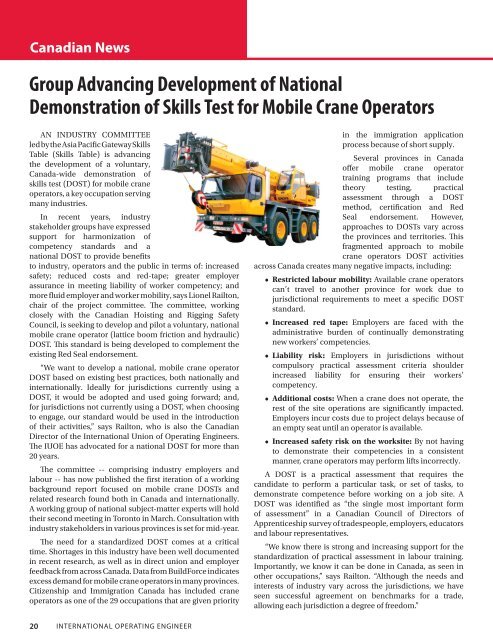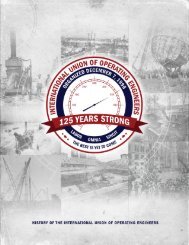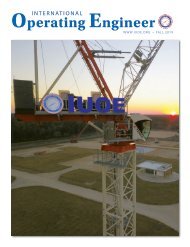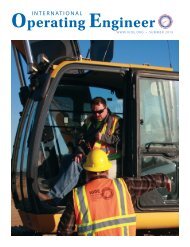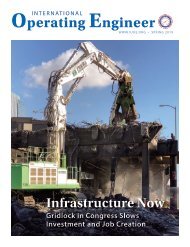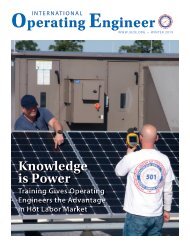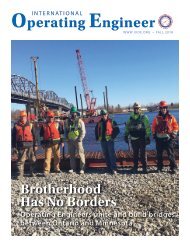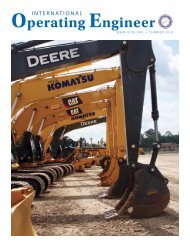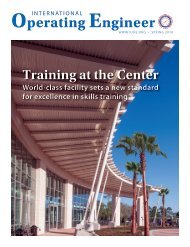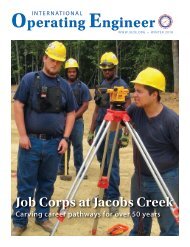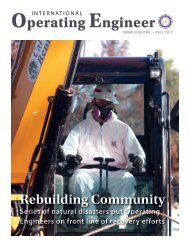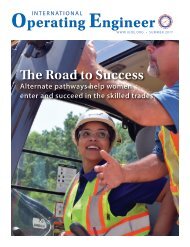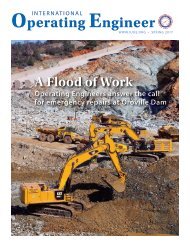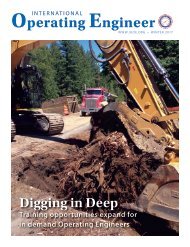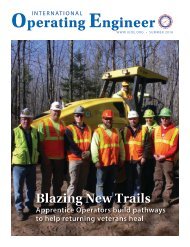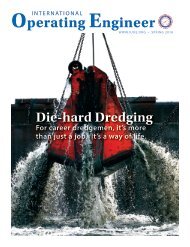Operating Engineer - Winter 2015
The quarterly magazine of the International Union of Operating Engineers.
The quarterly magazine of the International Union of Operating Engineers.
You also want an ePaper? Increase the reach of your titles
YUMPU automatically turns print PDFs into web optimized ePapers that Google loves.
Canadian News<br />
Group Advancing Development of National<br />
Demonstration of Skills Test for Mobile Crane Operators<br />
AN INDUSTRY COMMITTEE<br />
led by the Asia Pacific Gateway Skills<br />
Table (Skills Table) is advancing<br />
the development of a voluntary,<br />
Canada-wide demonstration of<br />
skills test (DOST) for mobile crane<br />
operators, a key occupation serving<br />
many industries.<br />
In recent years, industry<br />
stakeholder groups have expressed<br />
support for harmonization of<br />
competency standards and a<br />
national DOST to provide benefits<br />
to industry, operators and the public in terms of: increased<br />
safety; reduced costs and red-tape; greater employer<br />
assurance in meeting liability of worker competency; and<br />
more fluid employer and worker mobility, says Lionel Railton,<br />
chair of the project committee. The committee, working<br />
closely with the Canadian Hoisting and Rigging Safety<br />
Council, is seeking to develop and pilot a voluntary, national<br />
mobile crane operator (lattice boom friction and hydraulic)<br />
DOST. This standard is being developed to complement the<br />
existing Red Seal endorsement.<br />
“We want to develop a national, mobile crane operator<br />
DOST based on existing best practices, both nationally and<br />
internationally. Ideally for jurisdictions currently using a<br />
DOST, it would be adopted and used going forward; and,<br />
for jurisdictions not currently using a DOST, when choosing<br />
to engage, our standard would be used in the introduction<br />
of their activities,” says Railton, who is also the Canadian<br />
Director of the International Union of <strong>Operating</strong> <strong>Engineer</strong>s.<br />
The IUOE has advocated for a national DOST for more than<br />
20 years.<br />
The committee -- comprising industry employers and<br />
labour -- has now published the first iteration of a working<br />
background report focused on mobile crane DOSTs and<br />
related research found both in Canada and internationally.<br />
A working group of national subject-matter experts will hold<br />
their second meeting in Toronto in March. Consultation with<br />
industry stakeholders in various provinces is set for mid-year.<br />
The need for a standardized DOST comes at a critical<br />
time. Shortages in this industry have been well documented<br />
in recent research, as well as in direct union and employer<br />
feedback from across Canada. Data from BuildForce indicates<br />
excess demand for mobile crane operators in many provinces.<br />
Citizenship and Immigration Canada has included crane<br />
operators as one of the 29 occupations that are given priority<br />
in the immigration application<br />
process because of short supply.<br />
Several provinces in Canada<br />
offer mobile crane operator<br />
training programs that include<br />
theory testing, practical<br />
assessment through a DOST<br />
method, certification and Red<br />
Seal endorsement. However,<br />
approaches to DOSTs vary across<br />
the provinces and territories. This<br />
fragmented approach to mobile<br />
crane operators DOST activities<br />
across Canada creates many negative impacts, including:<br />
• Restricted labour mobility: Available crane operators<br />
can’t travel to another province for work due to<br />
jurisdictional requirements to meet a specific DOST<br />
standard.<br />
• Increased red tape: Employers are faced with the<br />
administrative burden of continually demonstrating<br />
new workers’ competencies.<br />
• Liability risk: Employers in jurisdictions without<br />
compulsory practical assessment criteria shoulder<br />
increased liability for ensuring their workers’<br />
competency.<br />
• Additional costs: When a crane does not operate, the<br />
rest of the site operations are significantly impacted.<br />
Employers incur costs due to project delays because of<br />
an empty seat until an operator is available.<br />
• Increased safety risk on the worksite: By not having<br />
to demonstrate their competencies in a consistent<br />
manner, crane operators may perform lifts incorrectly.<br />
A DOST is a practical assessment that requires the<br />
candidate to perform a particular task, or set of tasks, to<br />
demonstrate competence before working on a job site. A<br />
DOST was identified as “the single most important form<br />
of assessment” in a Canadian Council of Directors of<br />
Apprenticeship survey of tradespeople, employers, educators<br />
and labour representatives.<br />
“We know there is strong and increasing support for the<br />
standardization of practical assessment in labour training.<br />
Importantly, we know it can be done in Canada, as seen in<br />
other occupations,” says Railton. “Although the needs and<br />
interests of industry vary across the jurisdictions, we have<br />
seen successful agreement on benchmarks for a trade,<br />
allowing each jurisdiction a degree of freedom.”<br />
20<br />
INTERNATIONAL OPERATING ENGINEER


